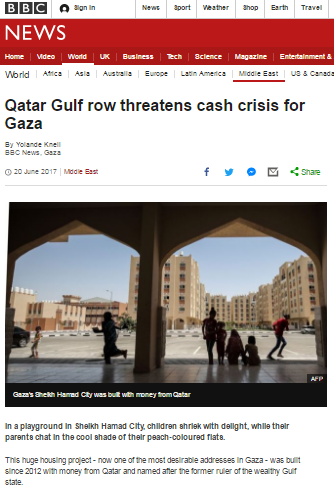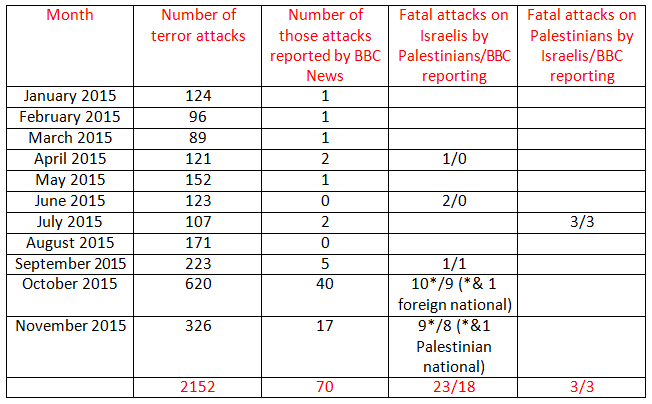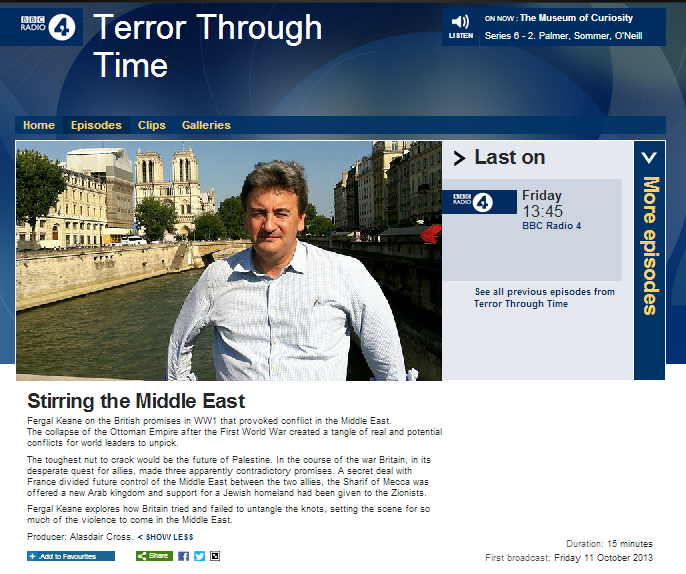On June 20th an article by Yolande Knell appeared in the ‘Features’ section of the BBC News website’s Middle East page under the headline “Qatar Gulf row threatens cash crisis for Gaza“.
The article is very similar to the audio report by Knell that was broadcast five days earlier on BBC Radio 4 and is notable for many of the same omissions.
Here too no mention is made whatsoever of issue of Hamas’ designation as a terror organisation by the EU, the US and numerous additional countries, meaning that readers are unable to put statements – such as the following – into their correct context.
“In recent years, Qatar has spent hundreds of millions of dollars on new homes, a hospital and main roads in the Gaza Strip. It has pledged about $1bn (£780m) more.
It is not yet clear how its projects will be affected by the ongoing row with Saudi Arabia and other Gulf Arab countries. They are trying to economically isolate Qatar, accusing it of fostering terrorism – a charge the emirate strongly denies.” [emphasis added]
Like the audio report, this one too gives a whitewashed portrayal of Qatar’s recent expulsion of some Hamas officials but fails to mention that Hamas operatives based in Qatar have directed terror plots against Israel in the past.
“Many leaders of the group [Hamas] – including its former head, Khaled Meshaal, have been living in luxurious exile in Doha.
Now as Hamas seeks to ease pressure on its patron, several have reportedly left at Qatar’s request.”
Knell tells readers that:
“One of Saudi Arabia’s demands has been for Qatar to stop backing Hamas, which runs Gaza.”
However, as was also the case in her audio report, Knell does not clarify that one of Saudi Arabia’s complaints is that Qatari support for Hamas undermines the Palestinian Authority.
As in her radio report, BBC audiences find unchallenged amplification of the terror organisation’s messaging in this latest report from Knell.
“Hamas leaders insist that Qatari help to Gaza has been primarily charitable.
“The houses that were built are not for Hamas, the streets that were asphalted are not for Hamas,” one senior figure, Mahmoud Zahar, tells the BBC.
“The humanitarian institutions – hospitals and schools, they’re also for the Palestinian people. All attempts to hitch Hamas to Qatar are wrong and void.””
And:
“”Qatar is being punished for speaking freely and supporting the Arab Spring,” remarks Hamas parliamentarian, Yahya Musa, at a small rally in Sheikh Hamad City.
“It’s being punished for supporting us and the resistance. We stand with our brothers to reject US plans against Qatar and the conspiracy against the resistance.””
Readers also find the following bizarre depiction of the electricity crisis in the Gaza Strip:
“Last week, Israel agreed to a PA plan to cut power supplies to two million people in Gaza that will reduce their daily average of four hours of electricity by 45 minutes.
Hamas accuses its political rivals of plotting with the Trump administration and Israel to unseat it in Gaza.”
Anyone unfamiliar with the story would not understand from Knell’s portrayal that the ongoing electricity crisis is actually the result of a long-standing internal Palestinian disagreement that was recently exacerbated when the Palestinian Authority announced its refusal to continue footing the entire bill for electricity supplied to the Gaza Strip by Israel. Hamas too refuses to pay for that electricity, preferring instead to spend millions of dollars on its military infrastructure. Yolande Knell, however, shoehorned Israel and the US into her warped portrayal of the story – even though she knows the true background to the crisis full well.
The BBC of course has a long record of under-reporting the relevant story of Hamas’ known misappropriation of construction materials for the purpose of terrorism and in this article readers find only the following poorly composed and unnecessarily qualified statement:
“Israel says Hamas has also used foreign funding to bolster its military infrastructure, which its blockade aims to keep from strengthening.” [emphasis added]
Knell also erases from audience view the root cause of both the border restrictions and past conflicts: Hamas terrorism.
“Nevertheless, Qatar’s initiatives have buoyed Hamas through difficult times – the tight border restrictions imposed by both Israel and Egypt, and three bloody conflicts with Israel.”
The very least that the BBC’s funding public would expect to find in a report concerning accusations of “fostering terrorism” by Qatar is an accurate and factual overview of the terror activities of one of its prime protégés. Both of Knell’s recent reports from the Gaza Strip fail to provide that information but do uncritically promote messaging that could just as easily be found in a Hamas press release.
According to its public purposes the BBC is supposed to provide its funding public with “accurate and impartial news, current affairs and factual programming of the highest editorial standards” in order to enhance their understanding of a particular story. In this case, that purpose is clearly not being met.
Related Articles:
Superficial BBC Radio 4 reporting on Qatar funding of Hamas




